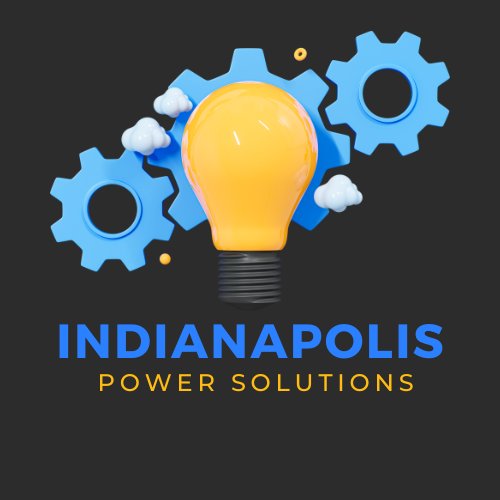
Whole House Generators in Lynhurst IN
A whole house generator is a powerful system designed to provide uninterrupted electrical power to your entire home during a power outage. Unlike smaller portable generators, which might only power a few essential appliances, a whole house generator is connected directly to your home's electrical system and can keep everything running smoothly. These systems kick in automatically when the power goes out, ensuring that you and your family stay comfortable and safe without needing to manually start the generator. Whole house generators come in several types, each suited for different needs:
- Standby Generators: These are permanently installed outside your home and connect directly to your home's electrical system. They run on natural gas or propane and start automatically during a power outage.
- Automatic Transfer Switch Generators: These systems automatically switch your home’s power source from the grid to the generator when an outage is detected. They ensure a seamless transition without manual intervention.
- Liquid-Cooled Generators: Ideal for larger homes or those with high power needs, these generators use a liquid coolant to regulate temperature, making them more durable and capable of handling higher loads.
- Air-Cooled Generators: Suitable for smaller homes, these generators use air to cool the engine and are generally less expensive and easier to maintain.
How it Differs from Portable Generators
Whole house generators and portable generators serve the same basic function but differ significantly in their design and capabilities:
- Power Output: Whole house generators can power an entire home, including major appliances and systems like heating and cooling, while portable generators typically handle only essential appliances.
- Automatic Operation: Whole house generators start automatically during an outage, whereas portable generators require manual startup and connection of appliances.
- Fuel Source: Whole house generators are usually connected to a natural gas or propane supply, making them more convenient for long-term use. Portable generators often run on gasoline and require frequent refueling.
- Installation: Whole house generators are installed permanently and integrated with your home’s electrical system, while portable generators are usually standalone units that need to be set up each time they're used.

We will get back to you as soon as possible.
Please try again later.
Professional Installation vs. DIY
When it comes to installing a whole house generator, professional installation is highly recommended:
- Expertise: Professionals have the knowledge and experience to install the generator correctly and ensure that it integrates seamlessly with your home's electrical system.
- Safety: Proper installation helps avoid potential safety hazards such as carbon monoxide leaks or electrical issues.
- Compliance: Professionals ensure that the installation complies with local building codes and regulations, which is crucial for the safety and legality of the system.
DIY installation might seem cost-effective, but it often lacks the precision and safety considerations that professionals provide. Incorrect installation can lead to system failures or safety risks, so investing in professional help is usually worth it.
Maintenance and Troubleshooting
Maintaining a whole house generator is crucial for ensuring its reliability when you need it most. Regular maintenance includes:
- Routine Inspections: Check the generator periodically for any signs of wear or malfunction. Look for leaks, unusual noises, or other indicators that something might be wrong.
- Battery Checks: Ensure the battery is in good condition and replace it as needed to avoid starting issues.
- Oil Changes: Regularly change the oil to keep the engine running smoothly. This is typically done every 100-150 hours of operation.
- Filter Replacements: Replace air and fuel filters according to the manufacturer’s recommendations to keep the system running efficiently.
Troubleshooting common issues involves checking for error codes on the control panel, ensuring fuel supply is adequate, and verifying that all connections are secure. If problems persist, consulting a professional is advisable to prevent further damage.
Long-term Savings and Investment Value
Investing in a whole house generator can lead to significant long-term savings:
- Avoiding Power Outage Costs: A whole house generator can prevent the costs associated with power outages, such as spoiled food, disrupted work, or damage from lack of climate control.
- Increased Home Value: Homes equipped with a whole house generator often have higher resale value. Buyers appreciate the reliability and security provided by these systems.
- Insurance Benefits: Some insurance companies offer discounts on premiums for homes with whole house generators, recognizing the reduced risk of property damage during outages.
- Reduced Emergency Costs: With a whole house generator, you avoid the emergency costs of renting or buying a portable generator and the hassle of managing its operation.
What are the Benefits
The benefits of a whole house generator extend beyond just keeping the lights on:
- Comfort and Convenience: Ensures that heating, cooling, and essential appliances remain operational during an outage, maintaining your family's comfort.
- Safety: Provides power for security systems, medical equipment, and other critical devices, ensuring that safety and health needs are met even during emergencies.
- Peace of Mind: Knowing that your home will have power during an outage reduces stress and allows you to focus on other important matters.
- Automated Operation: The automatic start and stop functions of a whole house generator mean you don’t have to worry about manually operating it during an outage.
What We Offer
At our company, we provide comprehensive
whole house generator services in Lynhurst, IN:
- Residential Generators
- Commercial Generators
- Portable Generators
- Electric Generators
- Propane Generators
- Solar Generators
- Generator Repairs
- Generator Maintenance
- Generator Parts
How to Choose the Right Generator For Your House
Selecting the right whole house generator involves several key considerations:
- Power Needs: Calculate your home’s power requirements by listing essential appliances and systems. This will help determine the generator size needed.
- Fuel Type: Choose between natural gas, propane, or diesel based on availability and convenience.
- Installation Space: Ensure you have adequate space for the generator and its components, including ventilation requirements.
- Budget: Consider both the initial cost and long-term maintenance expenses. Investing in a quality generator may offer better reliability and savings over time.
- Brand and Warranty: Opt for reputable brands with good warranties and customer support to ensure the generator's reliability and longevity.
Importance of Reliable Power in Homes
Reliable power is essential for modern living:
- Daily Activities: Many daily activities, from cooking to working from home, depend on a consistent power supply.
- Safety and Security: Reliable power ensures that security systems and emergency devices remain operational, protecting your home and family.
- Comfort: Essential systems like heating, cooling, and refrigeration rely on power to maintain a comfortable living environment.
In an era where power outages can occur unexpectedly, having a whole house generator ensures that your home remains functional and secure, regardless of external conditions.
Frequently Asked Questions (FAQs)
Q: How often should I have my whole house generator serviced?
A: It’s recommended to have your generator serviced every six to twelve months, depending on usage and manufacturer recommendations.
Q: Can I install a whole house generator myself?
A: While DIY installation is possible, professional installation is advised to ensure safety and proper integration with your home’s electrical system.
Q: What fuel types are available for whole house generators?
A: Common fuel types include natural gas, propane, and diesel. Your choice will depend on availability and your specific needs.
Q: How long can a whole house generator run continuously?
A: The runtime depends on the fuel supply and the generator’s capacity. Most can run for several days with a sufficient fuel supply.
Q: Will a whole house generator increase my home’s value?
A: Yes, having a whole house generator can enhance your home’s value and appeal to potential buyers.
For more information about whole house generators in Lynhurst, IN, or to schedule a consultation, contact us today. Our team of experts is ready to help you find the perfect solution to ensure your home remains powered and secure. Call us or visit our website to get started on securing reliable power for your home.
Let's Connect!
Ensure your home stays powered. Our whole house generators are your best defense against unexpected outages, keeping your family safe and comfortable. Discover how whole house generators work and why they're crucial for your home. Check out our buyer's guide to find the perfect fit for your needs and protect against the common reasons for loss of power. Contact us now!